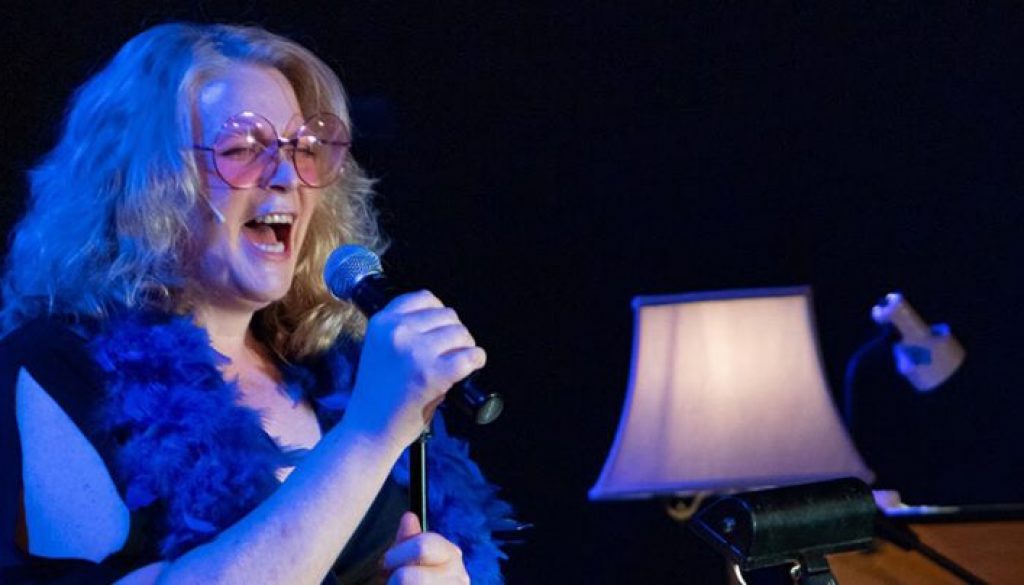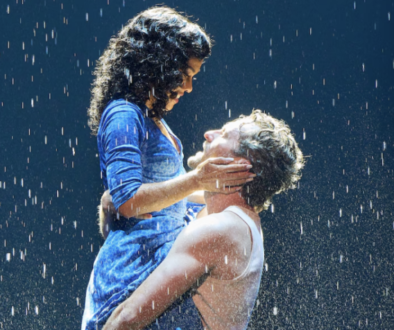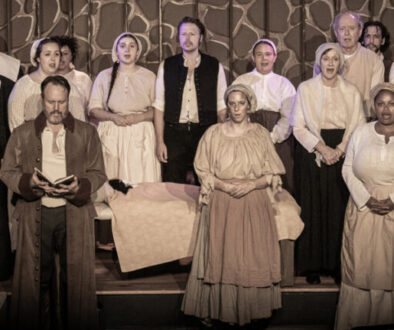By ALAN SMASON
For her first one-woman show in several years, Dorian Rush has opted to mount a most unusual presentation with producers Jonathan Mares Productions and the Jefferson Performing Arts Society. It’s all about the blues, but viewed strictly from the distaff side – 100 Years of Women in Blues.

Supported by pianist and guitarist Ainsley Matich throughout the two-hour and 10 minute long production, Rush surveys the blues from its outgrowth as a response to slavery to its rise from the Mississippi Delta and its early gestation in New Orleans and beyond to Memphis, Chicago and New York.
Rush, who has a powerful and sensual voice, moves from early blues icons like Bessie Smith, Ma Rainey and Mamie Smith to more recent pop figures like Aretha Franklin, Koko Taylor and Bonnie Raitt. Interspersed between songs she peppers the audience with well-researched commentaries on each figure along with a plethora of anecdotes about their interactions with men (or women) and what drew her to select them as elemental to the show.

But Rush does more than just sing the blues. She feels them in her essence and squeezes them not just through her vocals, but through her very pores. While never attempting to mimic each blues singer’s distinctive style, she does take ownership of their songs in a more than satisfying way and puts her own stamp on their iconic work.
Rush begins with “Stormy Monday” and a literal blackboard explanation of what defines the blues in theory and practice and then moves the show into the more modern era with an homage to New Orleans’ own blues queen, the late Marva Wright. As Rush acknowledges, Wright didn’t start her own successful blues career until she was in her 40s. So, she feels her entry into the blues field should not be considered “late” by any standards.
With an homage to Big Mama Thornton, Rush settles into the Lieber and Stoller classic “Hound Dog” that received its biggest hit with Elvis Presley a few years later. Rush’s rendition, which is true to Thornton’s original, is steeped in traditional blues unlike Presley’s rock and roll rendition that became more popular.
With “Ball and Chain,” she moves into a spotlight on Janis Joplin, who popularized the original Big Mama Thornton piece after moving from Port Arthur, Texas to San Francisco. Rush has enjoyed history with Joplin, having portrayed the rock and blues legend in Livin’ Janis in 2009. Her accessibility to Joplin and her music seems as natural as her breathing in and breathing out.

The second half of the show begins with Rush’s tribute to Billie Holiday and an examination of the things that should have precluded her from being considered a blues singer of note, notwithstanding a small voice in comparison to the blues pioneers of before. Yet, as Rush acknowledges, it was the microphone that allowed “Lady Day” to shine and be considered as equal in stature to the brassy and bellowing ladies whose voices rose above the din of gin joints and speakeasies.
She moves from Etta James’ “I’d Rather Go Blind” into Carole King’s classic for Aretha Franklin, “(You Make Me Feel Like a) Natural Woman.” Rush’s detailed background on Franklin gives audience members a true feeling that her life was as hard and bitter as any blueswoman who went before or after her. In many ways her public persona was completely foreign to what she endured in her lifetime.
If Aretha Franklin is considered “The Queen of Soul,” then there is, of course, the necessary homage to “The Soul Queen of New Orleans,” Irma Thomas. Rush absolutely revels in presenting Thomas’ first big hit “You Can Have My Husband, But Please Don’t Mess With My Man.” This leads to a reference to one of Thomas’ more risqué pieces “Hip Shakin’ Mama” with its sexual innuendo before leading to Rush’s rendition of Ruth Brown’s “If I Can’t Sell It,” a work with triple entendres.

Rush deals with other blues conventions of calling out and responses with Matich’s help in “The Dirty Dozens” before embarking on Koko Taylor’s “Wang Dang Doodle” with appropriate audience participation.
Rush sings Bonnie Raitt’s “Thing Called Love” and gives lots of background on the performer who rose up from addiction and became one of the best-loved and most popular blues and pop performers of the last four decades. By the time Sister Rosetta Tharpe’s “That’s All” is heard, there is little doubt that Rush has delivered on what has been advertised – a century’s worth of masterful matrons of the blues art form.
While the set design is simple, it is very functional and owes much to producer Jonathan Mares. Rush’s costume changes are few, but do help in transporting the audience through time as occasionally she will pull out a prop to help tell the story better. But the real story of the blues is rendered in her magnificent vocal offerings and for that reason alone 100 Years of Women in Blues is highly recommended.
“100 Years of Women in Blues” starring Dorian Rush continues at Teatro Wego!, 177 Sala Avenue in Westwego, LA, through Sunday, August 25. Tickets are available here or call 504-885-2000.





